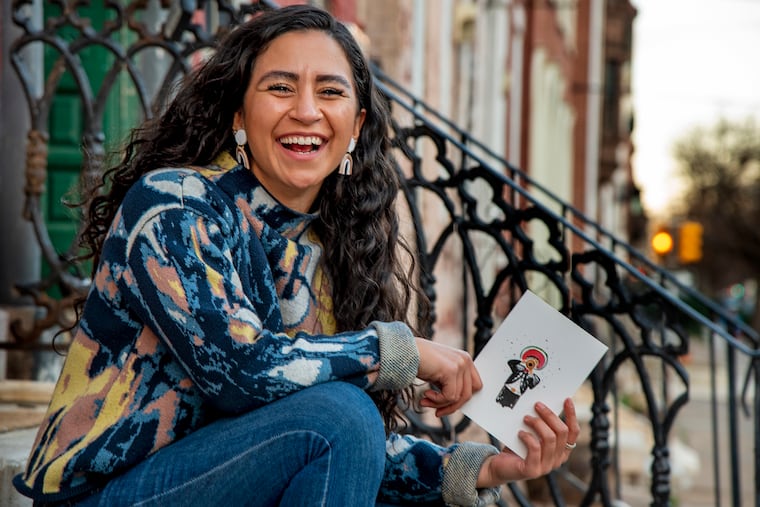Inspired by her Mexican heritage, this entrepreneur has a greeting card start-up hoping to give back to Philly
Carmen Aranda, 26, supports local organizations, uses recycled materials and hopes to give back to communities affected by the pandemic, while filling in diversity gaps in the greeting card industry.

Carmen Aranda, 26, became even more proud of her roots when she moved to Philadelphia in 2017 and began to work in community engagement with the evangelical congregation at Redemption City Church in Brewerytown.
Born and raised in a predominately white neighborhood in Georgia, Aranda, who is of Mexican and Italian descent, said the city’s rich Latinx scene connected her to regional leaders who’ve inspired her outreach work. She said it also gave her a space for racial healing and helped her grow and feel more confident about her heritage.
Aranda, a hospital researcher and a full-time counseling grad student at Missio Seminary, wanted to use her art skills as a way to help Philadelphia residents in need. When the pandemic hit, she learned about community members who had limited access to the internet and difficulty paying water and heating bills.
So, she decided to create late last year the greeting card start-up Cultivate, with the goal to celebrate Latinx culture and provide financial support to local organizations and community assistance funds that help those struggling during the pandemic.
“I know some people’s electricity bills are piling up, some who have gone through COVID themselves,” she said. “So, Cultivate comes as a way to proudly be Latina, while giving back to the community.”
According to Stanford University’s 2019 State of Latino Entrepreneurship report, the number of Latinx business owners has surged by 34% over the past decade, compared to 1% for all business owners in the United States. Yet, Latinx entrepreneurs face ongoing challenges to grow their businesses, such as difficulty in obtaining loans and other sources of capital.
Aranda, who launched the venture on Black Friday, used her savings to start Cultivate. Her watercolor designs are based on her childhood memories: celebrating birthdays with mariachi bands. Eating tres leches with her dad. Thinking about pan dulce while listening to Beyoncé, Luis Miguel, and Chance The Rapper.
The 5 x 7 cards, printed on recycled materials, come in bundles of three, six, nine, and 12 that she promotes on Instagram and sells via Venmo. Since Nov. 27, she has sold 600 cards in 10 states and abroad.
Rebekah Weeks, a fifth-grade teacher in Philly and Aranda’s best friend, said she has witnessed Aranda’s challenges juggling the demands of a new business.
“I know it’s been frustrating for her to work full-time, focus on crafting the art, and make the logistics work for the business, when she’s also full-time grad student,” Weeks said. “It’s just really hard.”
Aranda is also one of the few entrepreneurs who fill a void in the greeting card industry: It’s often referred to as a business sector where diversity and inclusion has been left behind, as the market doesn’t accurately represent nonwhite groups and underserves marginalized populations.
Holden Ohl manages Pretty Green Terrarium in South Philly, a gardening and stationary store that supports more than 20 local artists dedicated to art that incorporates the natural world. He said the company accepted Aranda’s cards because of the aesthetics around flowers and herbs, her use of sustainable sources, and the cards’ Spanish greetings.
Aranda plans to donate 10% of her December and January earnings to Peco’s Matching Energy Assistance Fund. Patricia King, community engagement manager for Peco, said the company wasn’t aware of Aranda’s intentions but applauds and appreciates her willingness to support low-income customers experiencing hardship in Philadelphia.
Jordan Denny is Aranda’s business mentor and the CEO for Momentary Ink, a Philly start-up-turned-million-dollar company that creates temporary tattoos. He said Aranda’s giveback model requires additional emotional investment to overcome the hurdles of putting together the products and the high financial risks.
Aranda launched a website Jan. 6 and plans to change the cards’ dimensions, create new designs, and offer them for individual sale. Once she graduates in summer 2022, she looks forward to using art as therapy for counseling as a Latina in the mental health field.
“I hope the designs recreate memories for other Latinos, too.”